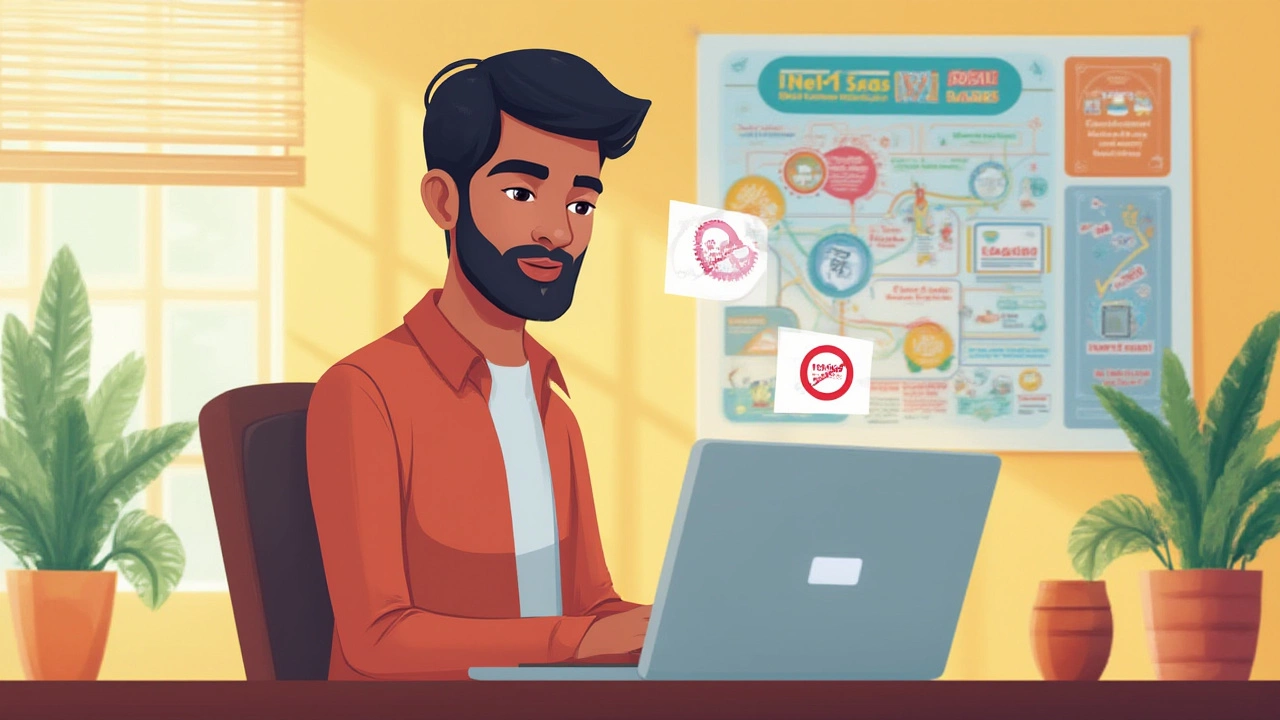Imagine investing weeks into designing your dream website, only for it to be yanked offline without warning. Wix holds a pretty hefty list of rules about what you can—and absolutely can’t—publish or sell using their platform. Some of these are obvious, others might shock you, and a few even come down to a single word or product choice. If you think this is all about keeping things squeaky clean, you're only half right. A misstep could mean your site vanishing in a heartbeat—and getting it back isn’t always as simple as sending a support ticket.
Core Prohibitions: What Wix Doesn't Allow
Wix wants its users to build whatever they imagine—but within clearly marked boundaries. Selling illegal goods or running get-rich-quick schemes? Instant shutdown. Their list of banned content stretches from the standard (drugs, weapons, counterfeit items) to the far more specific (unlicensed pharmaceuticals, lottery syndicates, custom malware). Anything promoting terrorism, violence, hate speech, or discrimination is never tolerated. And here’s a curveball: even if something’s legal in your country, that won’t help if Wix, based in Israel and bound by international agreements, has outlawed it globally or regionally.
Wix’s wix prohibited content policy focuses hard on user safety and platform integrity. No child exploitation or explicit pornographic material. Adult content overall has a level of grey—artistic nudity and sexual wellness education might slide, but producers of hardcore clips or explicit webcams will find themselves out of luck. And if you’re trying to spoof the government or run scams involving identity theft, just don’t even bother. These rules aren’t just talk. Wix actively scans sites with automated tools and follows up on user reports quickly and harshly.
If you want to see how wide their reach stretches, take a look at this data:
| Type of Content | Allowed on Wix? | Notes |
|---|---|---|
| Personal Blogs | Yes | As long as content stays within guidelines |
| Online Gambling | No | Strictly banned except for official entities with explicit licenses |
| Hate Speech | No | Zero tolerance |
| Unlicensed Pharma Sales | No | All medication sales must be legal and properly licensed |
| Adult Education | Yes | Must not be explicit or pornographic |
At the heart of it, Wix bases its approach on protecting users and its own reputation. The most surprisingly strict bans? Crypto-style Ponzi schemes, selling fake diplomas, or pushing miracle cures for diseases. And remember, if you try to get smart by hosting something questionable on a hidden page or subdomain, Wix still counts it as part of your account—and will block your whole site if you’re busted.
Grey Areas: Content That Triggers Extra Scrutiny
Not all bans are black and white, and you’d be amazed how much of the forbidden-zone lies in the details. Dropshipping is fine on Wix, but not if it’s for dangerous or restricted items. That vape hardware you want to sell? Forget it—Wix doesn’t want nicotine products, even if local law says it’s fine. This also covers things like CBD oil, cannabis edibles, and any derivatives—even from places where it’s 100% legal. They just don’t want the regulatory headache, so they zip it all off the table.
There are also strict rules around copyright. Sharing music, videos, fonts, or software for download can get you in hot water unless you have written proof of the license. Fan fiction communities and remix artists, take note—if a copyright holder sends a takedown notice, your site can disappear in a flash, no questions asked. Wix even blocks some entire website templates and plugins from third parties if they’re too risky.
Financial services have their own slurry of grey lines. If your website is advising on cryptocurrencies or stocks, Wix expects you to openly declare all risks and avoid promissory statements. Good luck running forex or binary options trades—those are straight-up banned since a string of scams hit the headlines between 2017 and 2020. Running a crowdfunding campaign for your cat’s vet bills? Sure. Trying to sell shares in a "hot new startup" with no paperwork? Don’t be surprised if you get an email from Wix legal.
Religion is handled more delicately. Personal belief sites, places of worship, and educational content about faith are welcome, but anything promoting hate or extremist recruiting stands no chance. This also bleeds into politics: advocating your opinion is fine, but using Wix to “dox” opponents or spread dangerous misinformation breaks the rules quickly.

Marketplace Restrictions: Selling on Wix Stores
The eCommerce world is booming, but Wix cracks down hard on anything dodgy that shows up in its selling platform. Aside from the obvious like drugs and weapons, they go deep with restrictions. You can’t sell fireworks or any pyrotechnic devices, medical devices that require a license, or any financial "products" like unregulated loans. The guidelines stretch to surprise areas, like branded knockoffs (think fake designer bags), software keys, or even domain name reselling.
The story doesn’t end there. If you use payment gateways like Stripe or PayPal through Wix, you’re bound by both the gateway’s and Wix’s rules. Payment processors are even stricter, especially when it comes to adult content, digital gambling, and international shipping of restricted goods. Sellers who’ve ignored these double rules often see their sites suddenly “disabled pending review”—which can last weeks or longer if you can’t provide paperwork proving you’re above board.
Review the actual analytics behind enforcement:
| Year | Sites Suspended | Main Violation Category |
|---|---|---|
| 2022 | 8,100 | Counterfeit goods |
| 2023 | 11,350 | Adult content & scams |
| 2024 | 14,900 | Unlicensed medicines & gambling |
What gets people in trouble most often? Not reading the Wix Store fine print. Even digital sellers slip up by trying to offer adult-oriented content packs, "lifetime access" cheats for games, or e-books on obvious scams. If you’re building a store, always check your supplier and your product lists against the full Wix forbidden items page.
User Conduct: Behavior that Gets You Banned
The rules aren’t just about what you publish—they also cover how you act. Spamming users, hacking attempts, phishing, or scraping Wix’s own databases can get your whole account nuked instantly. Threatening or doxxing other users, harassing people through site contact forms, or setting up elaborate fraud networks is sharply policed. Interestingly, even posting fake reviews or astroturfing your own blog can get your site suspended, especially if it looks like coordinated inauthentic behavior.
Wix has updated its rules every year since 2021, adding new clauses on AI-generated content, social engineering scams, and impersonation. If you try to use AI tools to push fake news or deepfakes, you’re playing with fire—Wix has added automated filters to block sites that repeatedly publish manipulated or misleading content. The same goes for phony charity drives or sites built to harvest data by trickery. Their platform actually uses a combination of reports, machine learning, and random spot checks to catch these schemes.
Running multiple "burner" websites just to avoid a ban won’t work. Your identity and payment details are cross-checked, so it’s shockingly easy for them to spot duplicate accounts, especially if you’re rerouting traffic or trying to trick the system’s fraud controls. Most users get just one warning—after that, Wix reserves the right to delete everything, with no option to appeal or recover lost data.

Keeping Your Wix Site Safe: Compliance Tips and Best Practices
So, how do people avoid running into trouble on Wix? The first, biggest tip: read Wix’s latest Acceptable Use Policy (AUP) in full before opening your site to the public. They update these documents at least twice a year, reflecting everything from copyright law changes to the latest platform scams. Set aside 15 minutes to go through it—you’ll save yourself hours (or even weeks) of headaches.
Always double-check new features: Wix sometimes quietly bans certain widgets, plugins, and payment integrations. If you got a plugin from an unofficial marketplace, make sure it’s on the approved list. For stores, verify product legality with both the supplier and local laws—and check payment partners’ rules too. It’s smarter to send a quick support ticket than risk a banned site.
- Don’t use “grey-market” or unlicensed images, fonts, or videos.
- Provide real contact information and a privacy policy.
- Avoid all get-rich-quick schemes—even as blog content or affiliate links.
- Be careful about user-generated content; if your readers post illegal stuff, you are still responsible.
- For sensitive topics (health, finance, adult), keep content factual and non-promotional.
If your site does get flagged, act fast. Respond to Wix’s emails, fix any issues, and document your communication. Sometimes a minor change or extra proof can restore a suspended website within days. But if you built your whole business on something dodgy, you’re better off moving elsewhere—or, better yet, finding a new business plan that doesn’t risk an instant ban.
At the speed that the internet—and the laws governing it—change, staying safe on Wix is less about following one set of rules and more about keeping your radar up. If you’re honest, transparent, and a bit careful around the tricky gray-zones, chances are you’ll never need to worry about waking up to a deleted website. But ignore the details, and you might find out just how quickly "publish" can turn into "permanently offline."






Written by Arjun Mitra
I am an IT consultant with a keen interest in writing about the evolution of websites and blogs in India. My focus is on how digital spaces are reshaping content creation and consumption. I aim to provide insights and strategies for those looking to thrive in the digital landscape.
All posts: Arjun Mitra